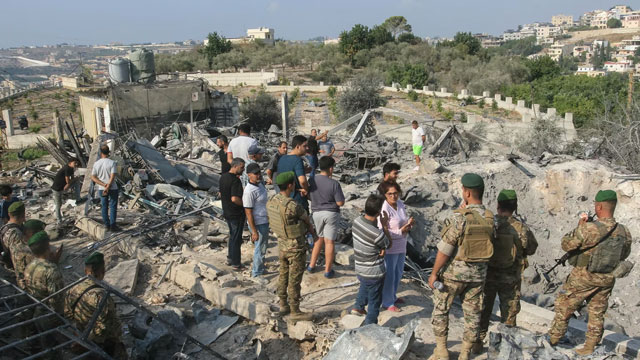Daijiworld Media Network - Beirut
Beirut, Nov 7: Tensions flared across the Lebanon-Israel border on Thursday as the Israel Defense Forces (IDF) launched a series of airstrikes on southern Lebanon, claiming to have targeted Hezbollah’s Radwan Force weapons storage sites. The Israeli military said the strikes were in response to attempts by the militant group to “rebuild terrorist infrastructure” in the region.
Lebanon, however, has condemned the attacks in the strongest terms. President Joseph Aoun accused Israel of violating international humanitarian law by striking civilian areas and forcing hundreds to flee their homes. “This is a fully fledged crime against Lebanon’s sovereignty,” Aoun said, adding that each act of aggression came even as his government pushed for peaceful negotiations with Israel.

Before the strikes, the IDF’s Arabic-language spokesperson Avichay Adraee issued evacuation warnings to several southern villages, urging residents to move at least 500 meters away from buildings allegedly used by Hezbollah.
Later, the United Nations Interim Force in Lebanon (UNIFIL) confirmed observing several strikes within its operational zone, including in Tayr Dibbah, Taibe, and Ayta al Jabal. UNIFIL termed the attacks as “clear violations of UN Security Council Resolution 1701,” which ended the 2006 Israel-Lebanon war and called for a complete halt to hostilities. The UN body warned that continued strikes threatened civilian safety and undermined diplomatic progress.
Fighting between Israel and Hezbollah reignited after the October 7, 2023 Hamas attack on Israel, when Hezbollah launched retaliatory assaults from Lebanese soil. Although a US-brokered ceasefire was established in November 2024, Israel claims that Hezbollah has continued to violate the truce — an allegation the group denies.
Amid the renewed tensions, the Lebanese Army said it was maintaining “close coordination” with UNIFIL and that joint monitoring continued “on a high level of trust.”
Meanwhile, Israel’s security cabinet was set to meet Thursday evening to discuss Lebanon and Hezbollah’s reported rearmament. Israeli Foreign Minister Gideon Sa’ar reiterated that the country “cannot ignore Hezbollah’s efforts to rebuild and rearm,” while military leaders have advised launching a broader operation to contain the group’s resurgence.
In contrast, Hezbollah dismissed the Israeli claims as “baseless,” accusing Israel of blackmailing Lebanon into political negotiations. “Lebanon will not yield to aggressive blackmail or compromise its sovereignty. We have every legitimate right to resist occupation and aggression,” the group said in a statement.
The escalation comes just days after US Special Envoy Tom Barrack referred to Lebanon as a “failed state” and cast doubt on Beirut’s ability to rein in Hezbollah. As tensions deepen, both nations appear to be moving further from the fragile ceasefire that had momentarily eased cross-border hostilities.